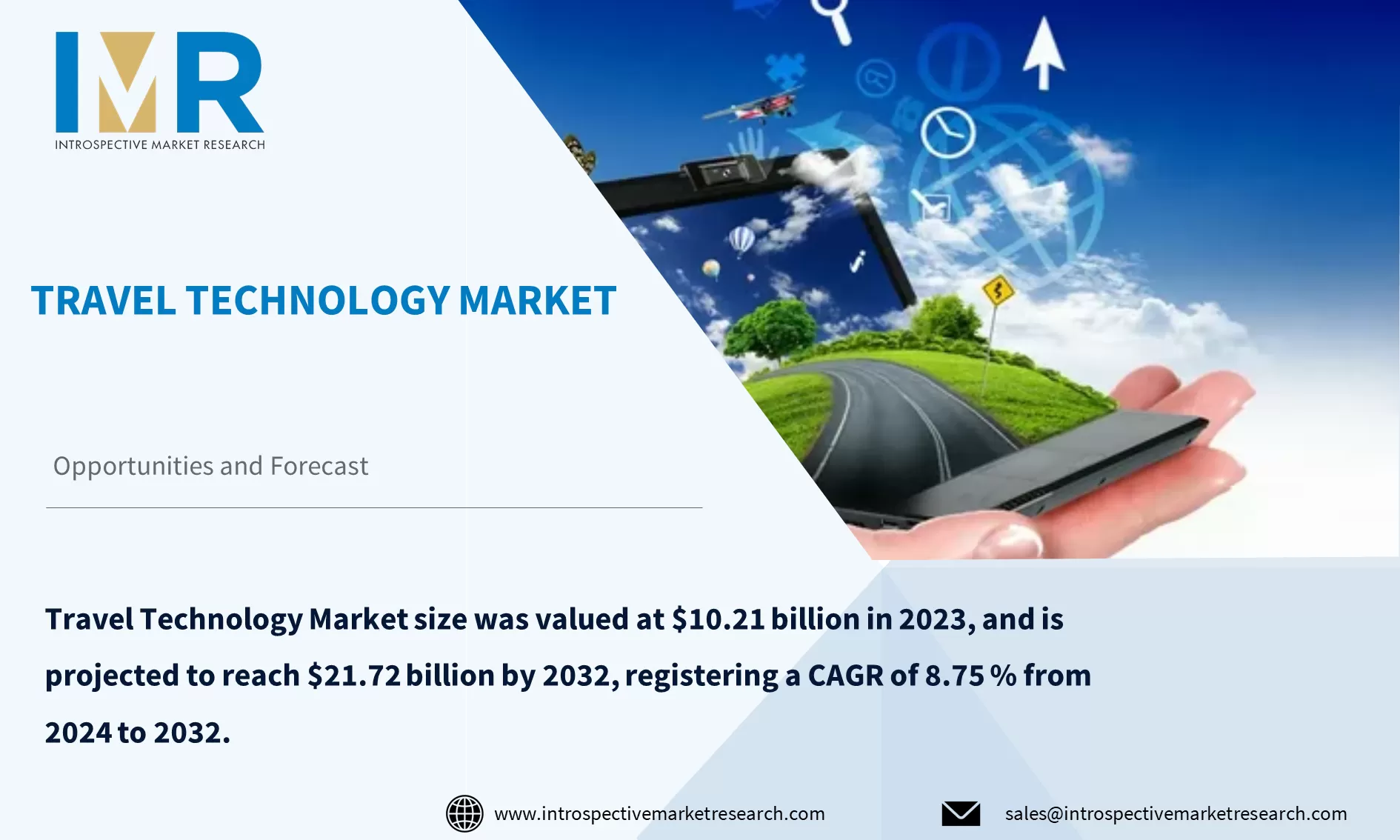
According to a new report published by Introspective Market Research, titled, ?Travel Technology Market by Type, Deployment Model, Technology and Region: Global Opportunity Analysis and Industry Forecast, 2024?2032
Global Travel Technology Market size was valued at $10.21 billion in 2023, and is projected to reach $21.72 billion by 2032, registering a CAGR of 8.75 % from 2024 to 2032.
Travel technology is the use of technology to plan travel and expedite travel-related activities, such as back-office operations for travel companies and organizations and bookings, stock management, billing, and scheduling. Customers may now e-book their travels thanks to this, enhancing reservation processes and increasing income. Technology has brought about a transformation in nearly every aspect of travel. When planning a trip, using technology makes it easier to research, organize, purchase, and engage with the trip?from making reservations and planning to exploring and sharing experiences. Due to technology advancements, the travel industry provides clients with a complete travel experience.
Travel technology offers a vast array of instruments and solutions. This includes online booking systems, review websites, chatbots, ride-hailing apps, IoT gadgets, digital payments, and virtual reality. Because of technology, travelers can now easily plan, organize, book, navigate, and discuss their trips. Additionally, they enable tourism-related businesses to reach, aid, and service travelers more successfully.
The digitalization process has changed the travel zone. In the past, calling a provider firm or speaking with them face-to-face was necessary to schedule an experience. By 2023, travelers will be able to plan their trips from the convenience of their preferred devices since all reservations will be made online. Mobile reservations can, in fact, fundamentally change the travel industry. The ease of use and accessibility of online booking is going to completely change how consumers make travel plans. Additionally, mobile reserving systems enable real-time updates and notifications to be communicated to agencies and clients, improving communication and performance. All things considered, the travel industry's use of generation can result in a more convenient and effective booking process for all involved.
Among the most innovative developments, virtual reality (VR) and augmented reality (AR) have become game-changers, giving visitors a fantastic way to explore locations even before leaving their homes.
The potential of AR and VR to provide passengers with an advance look at destinations, enabling them to make well-informed decisions, is one of the biggest effects of these technologies on travel planning. Travelers can use augmented reality (AR) to superimpose digital info on their devices' physical foreign usage. Users can interactively explore nearby attractions or view motel accommodations. Conversely, virtual reality (VR) produces fully simulated worlds that let consumers enjoy a 360-degree immersion in a vacation destination.
Global Travel Technology Market, Segmentation
The Travel Technology Market is segmented based on type, deployment model, technology, and region.
Type:
The type segment is further classified into Airline & Hospitality, IT Solutions, and Global Distribution System (GDS). Among these, the Global Distribution System (GDS) sub-segment accounted for the highest market share in 2023. The Global Distribution System (GDS) is a platform that facilitates travel booking by establishing connections between tour operators and lodging, airlines, and vehicle rental agencies. By offering real-time inventory and streamlining transactions, it makes the booking process easier for travel agents and suppliers. GDS is particularly helpful for business travel, as travel firms may bargain with airlines for discounted rates.
Deployment Model:
The Deployment model segment is further classified into On-Premise and Cloud-Based. Among these, the Cloud-based sub-segment is anticipated to show the fastest growth by 2032. Cloud solutions are frequently less expensive up front than on-premise solutions. Travelers who utilize the cloud typically only pay for what they use, delaying the need for expensive hardware purchases and an IT staff for maintenance. Entirely cloud-based systems are remarkably scalable. Companies don't need to buy extra hardware or software licenses because they may simply raise or decrease their use of beneficial resources as they see fit.
Region:
The Travel Technology Market in North America is projected to show the fastest growth by 2032. Due to its strong technological infrastructure, high internet penetration rate, and presence of major industry players, North America leads the travel technology market. The area has a robust uptake of online booking engines, customer relationship management (CRM) systems, mobile travel applications, and tour and hospitality software program solutions. Similar to how a subculture of innovation and a strong focus on enhancing customer satisfaction through customized journey solutions support this market supremacy. In North America, it is especially advised to integrate artificial intelligence, machine learning, and big data analytics. This will provide cutting-edge frameworks that enable tour operators, airlines, and hotel operators to maximize efficiency and provide personalized services.
Some of The Leading/Active Market Players Are-
- Expedia Group (US)
- Agilysys (US)
- Oracle (US)
- Dohop (Iceland)
- Travelport (UK)
- Trip Solutions (UK)
- Amadeus IT Group (Spain)
- GP Solutions (Germany)
- DIGITRIPS (France)
- Travelopro (India), and Other Active Players
Key Industry Developments
- In April 2023, the leader in the tourism technology space, tourist Buddy intends to enter the SAAR and Southeast Asian markets by 2025, a move that will daringly upend the tourist industry. Travel Buddy will emerge as a major disruptor in the contemporary exploration of these locations, driven by the desire to revolutionize people's travel behavior and experience. With cutting-edge technological solutions and an in-depth understanding of how traveler behavior is evolving, the company aims to become the primary facilitator of the travel experience in these emerging regions.
- In March 2023, the launch of Smart Point Cloud on Travelport+ was announced by Travelport, a global technology business that powers and facilitates reservations for tens of thousands of travel suppliers. Travelport+ is the only modern retailing system made specifically for companies. It will increase supplier sales of more important services while giving travel agents a simpler and more efficient way to provide and receive services. With the use of Smart Point Cloud, agents will be able to quickly search, filter, find, and create customized packages that are appropriate for every type of customer. These packages will include fully configurable flight and resort search options in addition to NDC offers.
Key Findings of the Study
- The Global Travel Technology Market is booming, reaching $10.21 billion in 2023, and is projected to hit $21.72 billion by 2032.
- Digitalization has transformed the industry, making trip planning and booking more convenient and efficient.
- Virtual reality and augmented reality provide immersive previews of destinations, aiding travelers in making informed decisions.
- North America leads with advanced technology and innovation, integrating AI, ML, and big data for personalized services.





